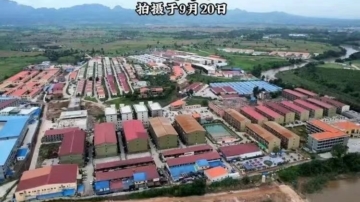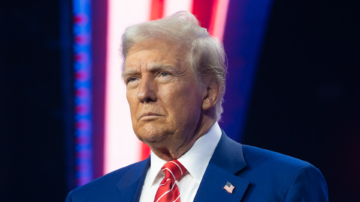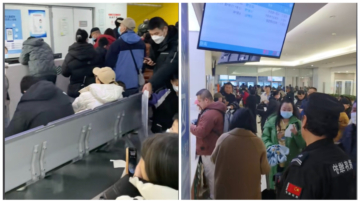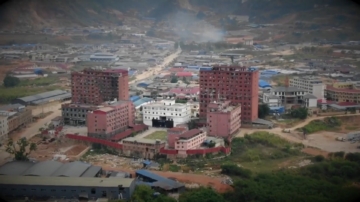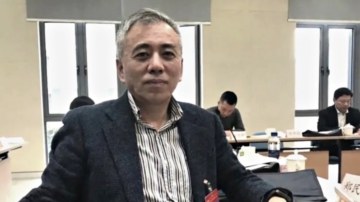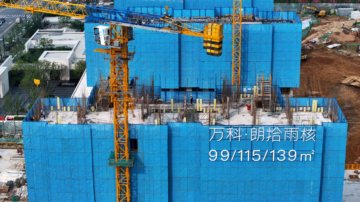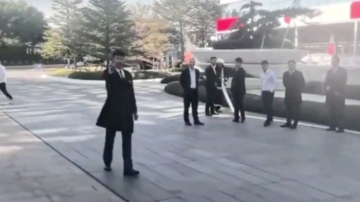【新唐人2011年7月25日讯】欧盟7月20号起开始实行“有史以来最为严厉的”《玩具安全指令》,任何进入欧盟市场的玩具,都需经过严格的安全和风险评估。这对面临倒闭潮的中国玩具商无疑是雪上加霜。
欧盟开始在27个成员国实施新版《玩具安全指令》。新指令从7月20号起对包装形状、玩具接缝拉力等细节、安全和风险评估,以及可追溯性等都有空前的严格要求。违反指令要求者,除了面临罚款、召回产品等处分,情况严重的将被追究刑事责任。
有分析人士指出,欧盟是中国最大的玩具进口区域,要求标准提高对于中国的玩具制造商,尤其是中小企业将带来巨大冲击。
与此同时,深圳东莞许多企业突然倒闭,其中就包括韩资的老牌“素艺”玩具厂。据报导,“素艺”曾经是世界第二大玩具品牌的代工厂,效益向来很好。 2008年全球经济衰退时,许多制造商倒下,“素艺”却挺了过来,今年却突然结业,预示了中国玩具制造商的前景坎坷。
和中国其他制造商一样,玩具制造商也面对劳工、电费等成本增加、融资艰难、外国订单减少等困境。根据专家估计,欧盟的新门槛,可能让中国厂商成本增加高达两成。因此,玩具制造商情况可说比其他制造业者更严峻。
有报导说,中国的倒闭雪球已经开始滚动,情况将比2008年全球经济衰退时更加惨烈。
不过,中国玩具商的生存加倍困难,其实是前因自种,作茧自缚。
2007年8月,中国制造的玩具中被检出含有高浓度的重金属铅、汞和镉,遭美国政府下令全面回收。事件震动全球,激起“反中国制造”潮流,一些非中国制造的玩具如乐高、摩比等成了优势产品。随着,网上出现了许多罗列非中国制造的玩具产品,帮助消费者作选择。
除了玩具,中国制造的儿童塑胶雨衣也被发现含有重金属,泡沫拼图垫子也验出含致癌物质。去年12月,法国和比利时对中国制造含有甲酰胺的婴儿和儿童的泡沫拼图垫子,颁布了禁令并进行调查。
欧盟新颁发的指令,就对特定重金属的限制由8种增加为19种,66种过敏性香料被明确限制使用,其中55种被禁用、11种香料的含量超过0.01%时需作出标注。此外,新指令还首次禁用致癌、致基因突变、影响生育的化学物质。
新唐人记者吴惟、葛雷综合报导。
New EU directive
Since July 20, EU began to implement
"the most stringent ever" Toy Safety Directive.
Any toy imported into the EU market is subject to
stringent safety and risk assessments.
This undoubtedly makes the situation worse for
China’s toy manufacturers that already face bankruptcy.
EU started implementing the new Toy Safety Directive
in its 27 member states.
Implemented on July 20, new directive has
unprecedentedly stringent requirements
on package shapes, product details,
toy safety and risk assessment and traceability.
Those who violate the requirements
will face punishments, such as fines and product recalls.
In serious cases,
they will be held criminally responsible.
Analysts say that
EU is the largest importer of Chinese toys.
Setting the bar higher on toys has a large impact on Chinese
toy makers especially the small- and medium-sized factories.
Meanwhile, in Shenzhen, Dongguan,
many enterprises became bankrupted suddenly.
These include famous Korean-owned
“Su Yi” toy factory.
It is said that “Su Yi” used to be the factory of the world’s
second largest toy brand, and had been very profitable.
“Su Yi” survived the global financial recession in 2008,
but was closed unexpectedly this year.
This foretells the gloomy future of
other Chinese toy makers.
Similar to other Chinese product manufacturers,
toy makers also face problems, such as
labor cost increase, electricity fee increase,
financing difficulties and decreasing foreign orders.
Experts estimated that with the EU’s new threshold,
the cost would increase by 20% for Chinese manufacturers.
Thus, toy makers will face a gloomier situation than others.
It is reported that the Domino effect of bankruptcy in China
has already been triggered.
The situation will be more horrible than
that in the 2008 global financial recession.
However, the Chinese toy makers should blame themselves
for their current hardship.
In Aug 2007, Chinese-made toys were found to contain
high concentrations of lead, mercury and cadmium.
The U.S. government ordered a full recall
of these toys.
This event was shocked the entire world,
leading to the anti-“made in China” movement.
Some non-Chinese-made toys, such as Lego and Play Mobil
have become consumers’ preferred products.
Afterwards, many lists of non-Chinese-made toys were
posted online, helping customers make choices.
In addition to toys, Chinese-made children's plastic raincoats
were also found to contain heavy metals.
Also, foam puzzle mats were found to contain carcinogens.
In December 2010, France and Belgium issued a ban and
conducted investigations on Chinese-made foam puzzle mats,
which contained form amide.
In EU’s new directive, the number of restrictions on
specified heavy metals increases from 8 to 19.
The use of 66 kinds of allergic fragrances is restricted.
Among them, 55 fragrances are forbidden to use.
For the other 11 fragrances, if their content exceeds 0.01%,
the toys made with them must be labeled.
For the first time, the new directive forbids the use of chemicals
that are carcinogenic, mutagenic and/or affect fertility.
NTD reporters Wu Wei and Ge Lei
欧盟开始在27个成员国实施新版《玩具安全指令》。新指令从7月20号起对包装形状、玩具接缝拉力等细节、安全和风险评估,以及可追溯性等都有空前的严格要求。违反指令要求者,除了面临罚款、召回产品等处分,情况严重的将被追究刑事责任。
有分析人士指出,欧盟是中国最大的玩具进口区域,要求标准提高对于中国的玩具制造商,尤其是中小企业将带来巨大冲击。
与此同时,深圳东莞许多企业突然倒闭,其中就包括韩资的老牌“素艺”玩具厂。据报导,“素艺”曾经是世界第二大玩具品牌的代工厂,效益向来很好。 2008年全球经济衰退时,许多制造商倒下,“素艺”却挺了过来,今年却突然结业,预示了中国玩具制造商的前景坎坷。
和中国其他制造商一样,玩具制造商也面对劳工、电费等成本增加、融资艰难、外国订单减少等困境。根据专家估计,欧盟的新门槛,可能让中国厂商成本增加高达两成。因此,玩具制造商情况可说比其他制造业者更严峻。
有报导说,中国的倒闭雪球已经开始滚动,情况将比2008年全球经济衰退时更加惨烈。
不过,中国玩具商的生存加倍困难,其实是前因自种,作茧自缚。
2007年8月,中国制造的玩具中被检出含有高浓度的重金属铅、汞和镉,遭美国政府下令全面回收。事件震动全球,激起“反中国制造”潮流,一些非中国制造的玩具如乐高、摩比等成了优势产品。随着,网上出现了许多罗列非中国制造的玩具产品,帮助消费者作选择。
除了玩具,中国制造的儿童塑胶雨衣也被发现含有重金属,泡沫拼图垫子也验出含致癌物质。去年12月,法国和比利时对中国制造含有甲酰胺的婴儿和儿童的泡沫拼图垫子,颁布了禁令并进行调查。
欧盟新颁发的指令,就对特定重金属的限制由8种增加为19种,66种过敏性香料被明确限制使用,其中55种被禁用、11种香料的含量超过0.01%时需作出标注。此外,新指令还首次禁用致癌、致基因突变、影响生育的化学物质。
新唐人记者吴惟、葛雷综合报导。
New EU directive
Since July 20, EU began to implement
"the most stringent ever" Toy Safety Directive.
Any toy imported into the EU market is subject to
stringent safety and risk assessments.
This undoubtedly makes the situation worse for
China’s toy manufacturers that already face bankruptcy.
EU started implementing the new Toy Safety Directive
in its 27 member states.
Implemented on July 20, new directive has
unprecedentedly stringent requirements
on package shapes, product details,
toy safety and risk assessment and traceability.
Those who violate the requirements
will face punishments, such as fines and product recalls.
In serious cases,
they will be held criminally responsible.
Analysts say that
EU is the largest importer of Chinese toys.
Setting the bar higher on toys has a large impact on Chinese
toy makers especially the small- and medium-sized factories.
Meanwhile, in Shenzhen, Dongguan,
many enterprises became bankrupted suddenly.
These include famous Korean-owned
“Su Yi” toy factory.
It is said that “Su Yi” used to be the factory of the world’s
second largest toy brand, and had been very profitable.
“Su Yi” survived the global financial recession in 2008,
but was closed unexpectedly this year.
This foretells the gloomy future of
other Chinese toy makers.
Similar to other Chinese product manufacturers,
toy makers also face problems, such as
labor cost increase, electricity fee increase,
financing difficulties and decreasing foreign orders.
Experts estimated that with the EU’s new threshold,
the cost would increase by 20% for Chinese manufacturers.
Thus, toy makers will face a gloomier situation than others.
It is reported that the Domino effect of bankruptcy in China
has already been triggered.
The situation will be more horrible than
that in the 2008 global financial recession.
However, the Chinese toy makers should blame themselves
for their current hardship.
In Aug 2007, Chinese-made toys were found to contain
high concentrations of lead, mercury and cadmium.
The U.S. government ordered a full recall
of these toys.
This event was shocked the entire world,
leading to the anti-“made in China” movement.
Some non-Chinese-made toys, such as Lego and Play Mobil
have become consumers’ preferred products.
Afterwards, many lists of non-Chinese-made toys were
posted online, helping customers make choices.
In addition to toys, Chinese-made children's plastic raincoats
were also found to contain heavy metals.
Also, foam puzzle mats were found to contain carcinogens.
In December 2010, France and Belgium issued a ban and
conducted investigations on Chinese-made foam puzzle mats,
which contained form amide.
In EU’s new directive, the number of restrictions on
specified heavy metals increases from 8 to 19.
The use of 66 kinds of allergic fragrances is restricted.
Among them, 55 fragrances are forbidden to use.
For the other 11 fragrances, if their content exceeds 0.01%,
the toys made with them must be labeled.
For the first time, the new directive forbids the use of chemicals
that are carcinogenic, mutagenic and/or affect fertility.
NTD reporters Wu Wei and Ge Lei

